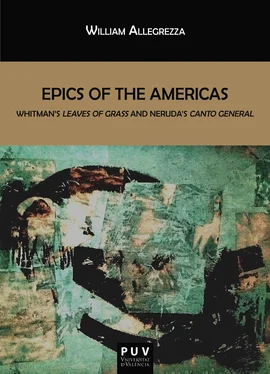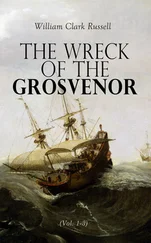William Allegrezza - Epics of the Americas
Здесь есть возможность читать онлайн «William Allegrezza - Epics of the Americas» — ознакомительный отрывок электронной книги совершенно бесплатно, а после прочтения отрывка купить полную версию. В некоторых случаях можно слушать аудио, скачать через торрент в формате fb2 и присутствует краткое содержание. Жанр: unrecognised, на английском языке. Описание произведения, (предисловие) а так же отзывы посетителей доступны на портале библиотеки ЛибКат.
- Название:Epics of the Americas
- Автор:
- Жанр:
- Год:неизвестен
- ISBN:нет данных
- Рейтинг книги:3 / 5. Голосов: 1
-
Избранное:Добавить в избранное
- Отзывы:
-
Ваша оценка:
- 60
- 1
- 2
- 3
- 4
- 5
Epics of the Americas: краткое содержание, описание и аннотация
Предлагаем к чтению аннотацию, описание, краткое содержание или предисловие (зависит от того, что написал сам автор книги «Epics of the Americas»). Если вы не нашли необходимую информацию о книге — напишите в комментариях, мы постараемся отыскать её.
Epics of the Americas — читать онлайн ознакомительный отрывок
Ниже представлен текст книги, разбитый по страницам. Система сохранения места последней прочитанной страницы, позволяет с удобством читать онлайн бесплатно книгу «Epics of the Americas», без необходимости каждый раз заново искать на чём Вы остановились. Поставьте закладку, и сможете в любой момент перейти на страницу, на которой закончили чтение.
Интервал:
Закладка:
In the years after Barlow, many theorists explored the idea of what the American poet needed to possess. In his influential essay “The Poet”(1844), Ralph Waldo Emerson outlined his ideas on the need for an American poet:
I look in vain for the poet whom I describe. We do not, with sufficient plainness, or sufficient profoundness, address ourselves to life, nor dare we chant our own times and social circumstance. If we filled the day with bravery, we should not shrink from celebrating it … We have yet had no genius in America, with tyrannous eye, which knew the value of our incomparable materials, and saw, in the barbarism and materialism of the times, another carnival of the same gods whose picture he so much admires in Homer. (179)
For Emerson the potential for great poets already existed in the United States, but up to that point American poets had not focused on the actual experience of Americans, barbarous though it might seem at first. To create a new American tradition, the American poet must mold the raw materials of the United States with a spirit like that of Homer, with the epic spirit. Many thinkers had similar ideas as Emerson. For example, a few years earlier in 1835, Alexis de Tocqueville discusses the qualities that he envisions for the future of American poetry—he is in accordance with Emerson in stating “there are no American poets” (485). Tocqueville states, “Democracy shuts the past to poetry but opens the future … None of the single, nearly equal, roughly similar citizens of a democracy will do as a subject for poetry, but the nation itself calls for poetic treatment” (485). Tocqueville posits the need for a work, an epic, concerning the nation and an epic that treats the problem of the lacking personality of American citizens; moreover, Tocqueville’s words can easily function as a preface for Whitman’s attempt at an American epic in Leaves of Grass . 6
Whitman’s Leaves of Grass is considered by many critics, such as Roy Harvey Pearce, James Miller, and Jeffrey Walker, as the foundation of the epic in the United States. 7 Ezra Pound in 1909 declared of Whitman, “He is America” (“What I Feel” 59). Later versions of the American epic relate to Whitman’s work—they are all Whitmanesque in their desires and deviations. Pearce stresses this quality by stating that all American poets go to Whitman before starting the epic (101). This is especially true within the last hundred years among poets like Ezra Pound in Cantos , Hart Crane in The Bridge , William Carlos Williams in Paterson , Charles Olson in The Maximus Poems , and John Berryman in Dream Songs . These works, as Pearce notes, share the fact that the poet is the hero and that the poet is struggling to create something of himself or herself (134). These poems maintain Pound’s dictum, “An epic is a poem including history” ( Literary 86); they all concern the present and through the present point towards the future or the potential the future holds. These poets, like those of Latin America, felt a need to create a national work, a work that ties the pieces of a sprawling country into one whole with a shared mythology and a shared history, which suggests that poets in the Americas do not view the epic in the same manner as Bakhtin in Dialogic Imagination . Bakhtin argues that the epic concerns a national past, but one that is distant from the contemporary world so that the poet has no access to it (13). This distance allows for valorizing tradition and the past, as he says, “all really good things … occur only in the past” (15). 8 While Bakhtin believes that the epic stresses this point, he disagrees with its value. For the classical epic, Bakhtin’s comments apply, but not for American epics, in which poets write about history but contemporary history. They do not valorize the tradition; rather, they view their tasks as explorations in historiography; they are creating new stories to populate the landscape along with the people.
Whitman’s and Neruda’s Lyric-Epics
Whitman and Neruda faced many of the problems of other American poets, such as pulling away from European paradigms, fashioning convincing New World epic heroes, and presenting the community through the individual, but still both desired to write an epic. For Whitman that desire formed in the 1840s, and he spent the remainder of his life working on it. Numerous critics, most emphatically Harold Bloom, note Whitman’s reading of Emerson during the 1840s, despite Whitman’s claims later in life not to have been reading Emerson, and suggest that Whitman takes his ideas on the American epic poet from Emerson, yet Whitman’s reasons for writing an American epic are complex (3). Like Emerson he declares his desire to capture the place and time, to proclaim an unique social and political identity for the United States. Closely tied to this idea, Whitman expresses the desire to provide witness to American events. Since epics provide foundational texts, Whitman desires a poem with a national scope to distinguish American literature. Whitman believes that contemporary American literature relies on European literature. To address this concern, Whitman wants a literature specifically American. He believes in democracy, and it is his democratic ideals that foster his belief in the need for an American poetry. George Kateb suggests that this belief inspires Whitman to be one of the best thinkers on democracy ever (240). Kateb’s evaluation of the importance of Whitman’s democratic ideas is clearly debatable, but Kateb does note the connection between democracy and the American poet. For Whitman, America needs new poetry to match its new political system. In other words, Whitman considered the democratic laws of the United States an experiment. To succeed he suggests that the United States must have a democratic culture to foster democratic institutions. America must have a religion, rituals, ceremonies, traditions, and histories that foster democratic thought. Through fostering such a culture, Whitman believes that the United States will be able to produce great works of art and great people. In Democratic Vistas , Whitman states this desire:
Our fundamental want to-day in the United States, with closest, amplest reference to present conditions, and to the future, is of a class, and the clear idea of a class, of native authors, literatures, far different, far higher in grade, than any yet know, sacerdotal, modern, fit to cope with our occasions, lands, permeating the whole mass of American mentality, taste, belief, breathing into it a new breath of life, giving it decision, affecting politics far more than the popular superficial suffrage, with results inside and underneath the elections of Presidents, or Congresses—radiating, begetting appropriate teachers, schools, manners, and, as its grandest result, accomplishing … a religious and moral character beneath the political and productive and intellectual bases of the States. (956)
To create this class of writers is Whitman’s fundamental desire in Leaves of Grass . He believes in the efficacy of literature in performing this task; the poet, for Whitman, “shapes aggregates and individuals” (957). For these reasons Whitman created Leaves of Grass as the American lyric-epic, and in it he introduces ideals that he sets forth as essential for democratic culture: union, camaraderie/fraternity, freedom, individuality, and progress. In the 1876 preface to Leaves of Grass , Whitman calls the work “a radical utterance” (1035) born out of democracy. He imagined that his utterance would reshape American life.
Pablo Neruda intimately knew Whitman’s ideas for creating an American epic, and in Canto general , he expresses many of the same ideas. While writing Canto general , Neruda told Maurice Halperin that he was working on a poem which “will attempt to reveal the deep process of historic transformation through which Chile has passed. I want to counter-balance the effect of the great poetry of the classics, such as Ercilla and Pedro de Oña” (168). Neruda also said of Canto general :
Читать дальшеИнтервал:
Закладка:
Похожие книги на «Epics of the Americas»
Представляем Вашему вниманию похожие книги на «Epics of the Americas» списком для выбора. Мы отобрали схожую по названию и смыслу литературу в надежде предоставить читателям больше вариантов отыскать новые, интересные, ещё непрочитанные произведения.
Обсуждение, отзывы о книге «Epics of the Americas» и просто собственные мнения читателей. Оставьте ваши комментарии, напишите, что Вы думаете о произведении, его смысле или главных героях. Укажите что конкретно понравилось, а что нет, и почему Вы так считаете.












